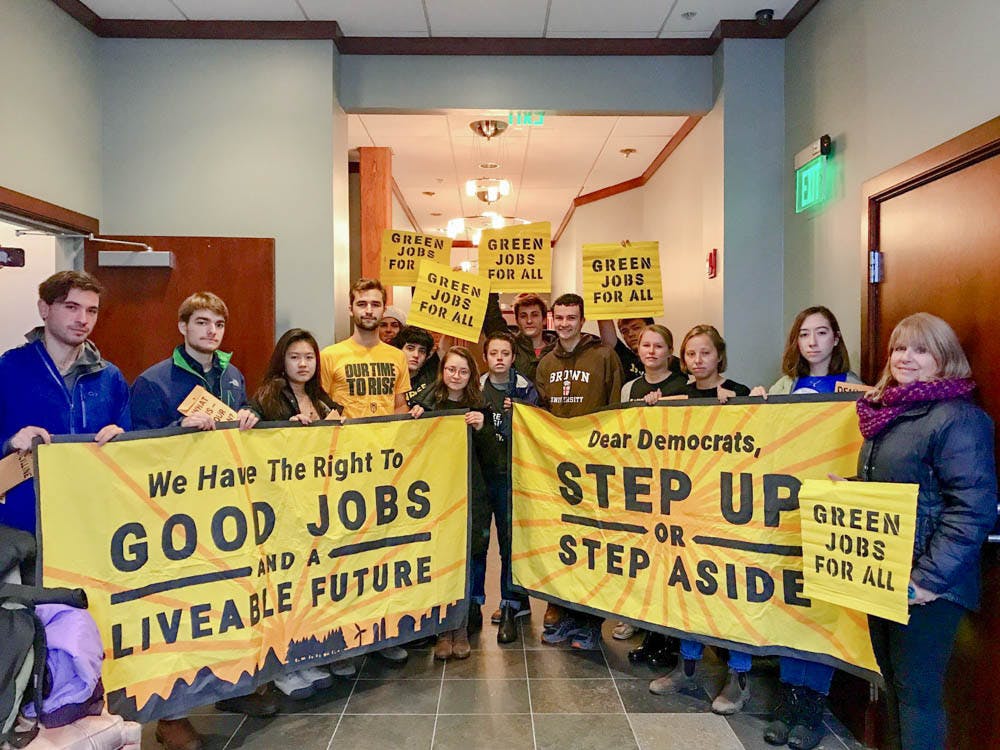Dozens of members from the Sunrise Movement’s Rhode Island chapter, most of them University students, civilly protested in Washington D.C. in November and December for progress on climate change policy and the Green New Deal. Several participants were arrested after hours of protests in Speaker of the House Nancy Pelosi’s office, including Sunrise Rhode Island leaders Lauren Maunus ’19 and Emma Bouton ’20.
But Sunrise Rhode Island didn’t even exist last August. Instead, Maunus and Bouton led the Brown chapter of the Rhode Island Student Climate Coalition, a state coalition of various community groups focused on environmental sustainability and policy. They teamed up with relevant community partners to do both lobbying and legislative work in the state.
The group made the switch from RISCC to Sunrise in September, and students “dove in,” Bouton said, adding that their numbers have since jumped from about 20 to 100 members.
When the leaders of RISCC reconvened this past fall to reevaluate their structure and purpose, “Sunrise was gaining a lot of traction at the national level,” and they thought they could “jump on board and learn from their messaging and clearly defined goals,” Maunus said.
The Sunrise Movement, an environmental activist organization with hubs across the country, gained attention after teaming with freshman Rep. Alexandria Ocasio-Cortez, D-NY, to bring attention to the Green New Deal. The pillars of the plan include “a transition off fossil fuels to a carbon free economy,” job creation and attention to vulnerable communities who will be the hardest hit by climate change, said J. Timmons Roberts, a professor of environmental studies. Ocasio-Cortez and Sen. Ed Markey, D-MA, are set to release a resolution “probably later this week” regarding the deal, Maunus said.
With “all the mobilization that happened around the Green New Deal this fall,” it seemed to be the perfect time to transition from RISCC to Sunrise, Bouton said. Under RISCC, “it didn’t seem like we had a real clear purpose,” Maunus added. “We were elevating other community groups’ efforts and campaigns and showing up at events at the statehouse,” but they were missing a mission of their own. “It just ebbed and flowed contingent on other groups’ energy,” while lacking students who were invested and energized, she said.
Under RISCC, students worked with community partners such as No LNG in PVD to fight the construction of a liquefied natural gas plant in Providence and Energize Rhode Island Coalition to push for carbon pricing legislation, Bouton said. RISCC also actively works with the Environmental Council in Rhode Island, which was heavily involved in the passage of the Resilient Rhode Island Act in 2014.
While University students have “continued a lot of that under Sunrise,” they now have a larger focus, Bouton said. With the “urgency of the climate change,” work at the national level is imperative, Roberts said. “I do think it’s appropriate to be focusing nationally,” especially on pressuring Congress to take action, he added. Being a part of a national organization gives activists at the state level more direction and insight into the broader policy discussion, he said.
Last semester, Sunrise Rhode Island gathered about 40 people who were “willing in the middle of finals to go down to D.C. and even risk arrest for the cause,” Maunus said, emphasizing the energy present around climate activism.
The group staged sit-ins, alongside other Sunrise chapters, in Speaker of the House Nancy Pelosi’s office demanding democratic action on climate change, returning to D.C. about three weeks later for a second show of protest. On the national level, “Sunrise is building a movement, creating political power,” Roberts said.
Sunrise Rhode Island is currently calling on the state’s congressional delegation to come out in support of the plan “as soon as possible,” she added. Rep. David Cicilline, D-RI, pledged his support for the policy in December, while Sen. Sheldon Whitehouse, D-RI, Sen. Jack Reed, D-RI, and Rep. Jim Langevin, D-RI, have not, as of December, ecoRI reported. Sunrise is also demanding that Democratic nominees for president both champion the bill and reject money from fossil fuel executives, Maunus said.
Bouton and Maunus hope their arrests in D.C. compel politicians to “take this crisis as seriously as we do,” Maunus said. “I knew I had to make this sacrifice.”
While students are “notoriously hard to organize,” Bouton said, and their group has grappled with a lot of turnover, they aim to build on a history and legacy of youth protest. “There’s still the narrative of young people rising up and fighting for our future. … We didn’t create all of this destruction, but we are going to face the most severe consequences of adult decision makers,” Maunus said.





